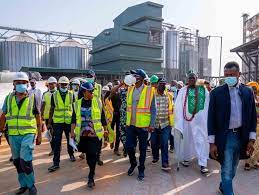The governor of Lagos State, Babajide Sanwo-Olu has said that the 32-metric tons per hour Rice Mill being constructed by the State Government in Imota area of Ikorodu division will start operations before end of first quarter in 2022.
The governor disclosed this during the on-the-spot assessment of the project, nothing that the facility would be subjected to a pre-production test run before the end of first quarter next year, after which the full production capacity would be activated.
The rice mill has been built with a capacity to ensure a steady supply of freshly processed rice of about 2.8 million bags of 50kg bags of rice per annum, while generating 1,500 direct jobs and 254,000 indirect jobs.
Ooni Supports Local Food Production as Titan Farms Opens Rice Factory
However, to facilitate a seamless supply of input for the facility, Lagos will undertake a backward integration strategy in the form of collaboration with other rice producing states such as Kwara, Sokoto, Benue, Borno and Kebbi to meet the paddy requirement of the mill.
Sanwo-olu who was accompanied by Commissioner for Agriculture, Abisola Olusanya, and members of the State cabinet, stated that he was happy with the progress of the project, explaining that the project would have been delivered by the end of 2020, but was disrupted by the outbreak of Coronavirus.
Benin Seeks to Band With Nigeria on Rice Production
He expressed that the new deadline remained sacrosanct, promising to prevail on all contractors working at the site to ramp up their activities before the next year first quarter.
“What is left is to see how quickly we can ramp up work on the storage facility, which has the capacity to take production up to three to six months. There are 16 silos which have combined capacity of 40,000 metric tons. Each has 2,500 metric tons. The two sections of the silos are at about 85 and 70 per cent completion.” Sanwo-olu said



